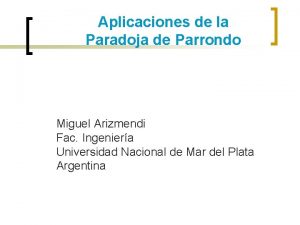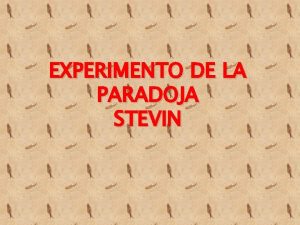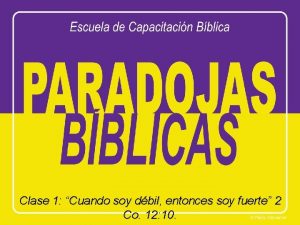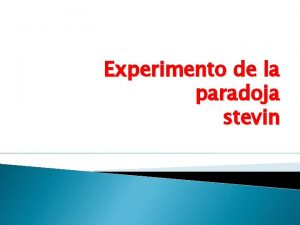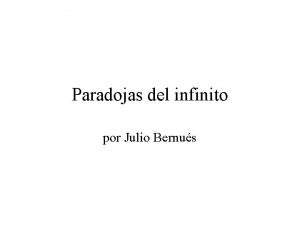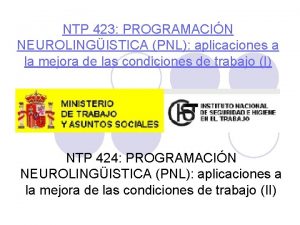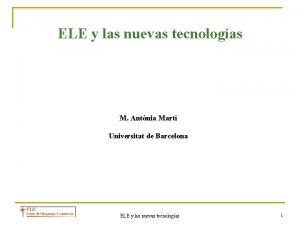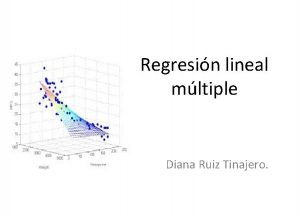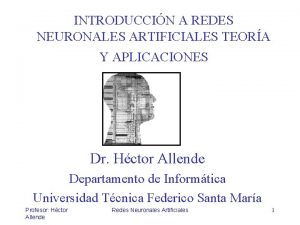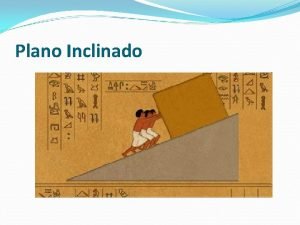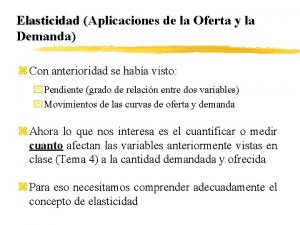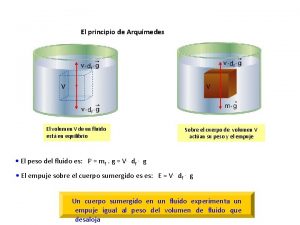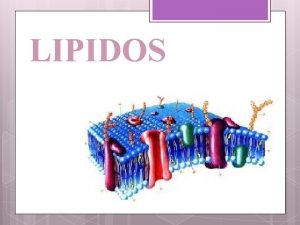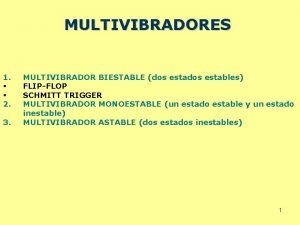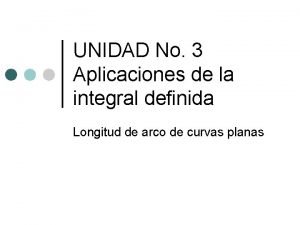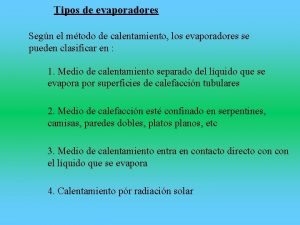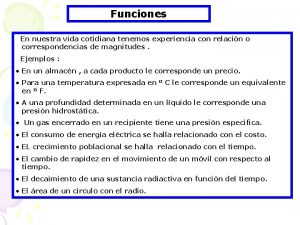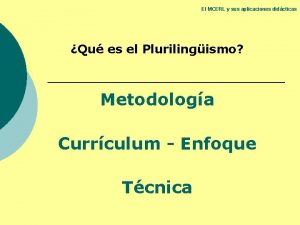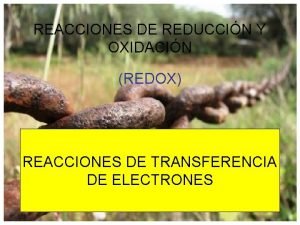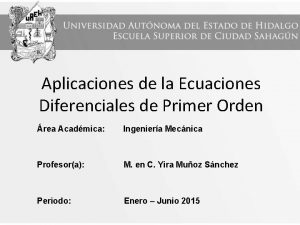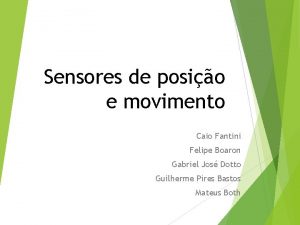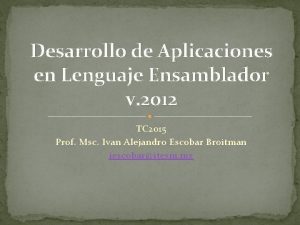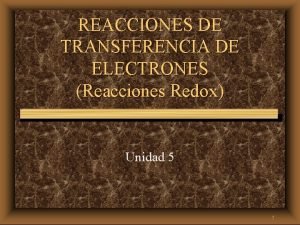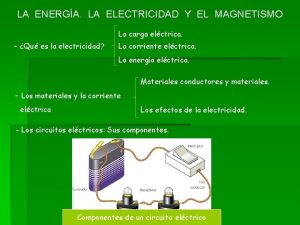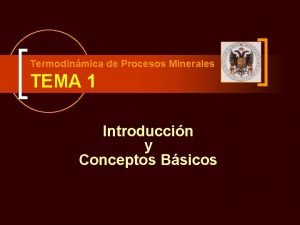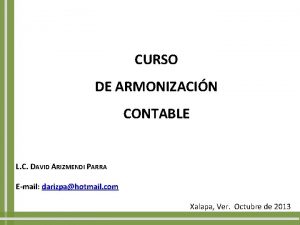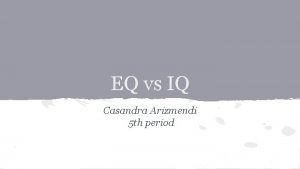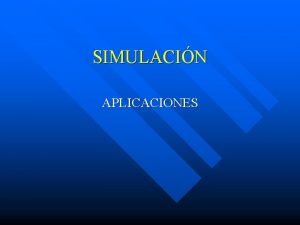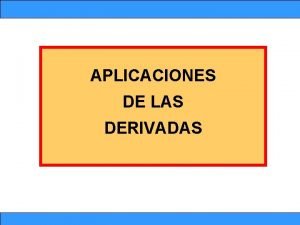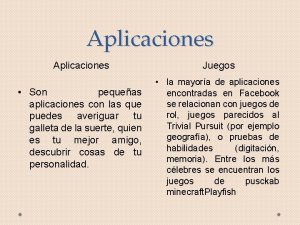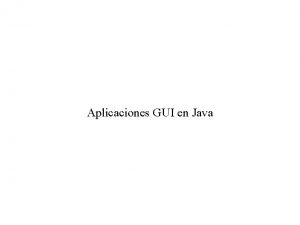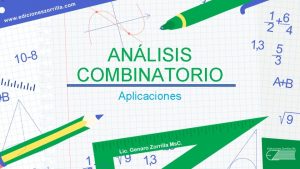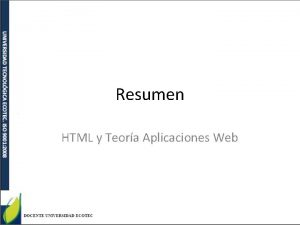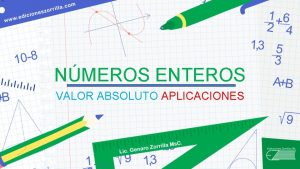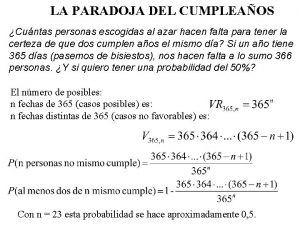Aplicaciones de la Paradoja de Parrondo Miguel Arizmendi



















































- Slides: 51

Aplicaciones de la Paradoja de Parrondo Miguel Arizmendi Fac. Ingeniería Universidad Nacional de Mar del Plata Argentina

Losing in order to win n Chess sacrifice bishop

N/2 Wrongs Make a Right

The Truel

Motores Moleculares

Parrondo’s Paradoxical Games

Biology is wet and dynamic. Molecules, subcellular organelles and cells, inmersed in an aqueous environment, are in continous riotous motion. H. C. Berg – Random Walks in Biology

Games

Length scales The small size of molecular machines means that their physics is dominated by thermal fluctuations – macroscopic intuition is of limited use

Energy Scales Thermal Energy For proteins in water this energy is taken from collisions with water molecules

Life at Low Reynolds Number Reynold’s number: Re = v. Lr/h v speed of the object – L characteristic length ρ liquid density and η viscosity Example: fish vs. bacterium

• fish of density approximately that of water (r = 1 gm/cc), length of 10 cm (L), moving at a velocity of 100 cm/sec (v) in water (h = 0. 01 g/cm sec), we calculate Re to be about 105. • bacterium of the same density, length of 1 micron (L = 10 -4 cm), moving at a velocity of 10 -3 cm/sec through water, we calculate Re to be 10 -5.

What about Proteins? • fish we calculate Re to be about 105. • bacterium we calculate Re to be 10 -5. • protein: size ~ 6 nm, speed 8 m/s in water Re ~ 0. 05 Overdamped


Quenched disorder effects on deterministic inertia ratchets

Games • Processes like this with no memory are called Markov Processes

Random Walks and Diffusion For short times and distances, diffusion is very fast K+ ion in water goes 1 micron in 0. 25 ms, 0. 1 mm in 0. 25 s For long time and distances, diffusion is very slow, K+ ion goes 1 m in 8 years.

Why bother moving? Rickettsia (tifus) ~ 100 years for mitochondrion synthesized in spinal chord to get to foot synapse. Active Transport is necessary: molecular motors

Molecular Motor Model Two basic features are needed for the existence of directed transport : The system must be out of its equilibrium state Breaking of spatial inversion symmetry Breaking of thermal equilibrium: Accomplished either through stochastic or periodic forcing : F(t) Ratchet potential : it consists of a periodic and asymmetric potential

Molecular Motor Model Can a Net Current J be obtained from Noise? Thermal Ratchet Model Thermodynamics Second Law?

Feynman Lectures: Ratchet and Pawl

Maxwell’s Demon

i=1 i=2


Flashing Ratchet Current


Flashing Ratchet Current / Entropy - MA, JR Sanchez and F. Family: PLA 249, 281 (’ 98) Physica A 327, 111 (2003)

Thermal Ratchet: Not a very good molecular motor model • Force against viscous loads ~ 2 k. T/l ~ 1 p. N << 45 p. N (measured value) • Diffuses in the right direction half of the time 2 molecules ATP hydrolized in average/step. • 1 step/ATP hydrolized for kinesin (J. Howard, Mechanics of Motor Proteins and the Cytoskeleton, Sinauer, 2001)

Highly diffusive, several ATP molecules hydrolyzed/step


What about Games?

Game A Game B : Player’s capital at -th run ¿Is X(t) a multiple of 3 ? Yes No win lose (Fair games) win lose

Is X(t) a multiple of 3? No Yes

Plays game A Random case The player, with probability Plays game B Periodic case The player alternates between game A and B following a given Sequence of plays. Average gain of a single player versus time with a value of The simulations were averaged over 50000 ensembles. -Amengual y Toral: 'Transfer of information in Parrondo's games‘, Fluctuation and Noise Letters 5, L 63 (2005)

The 2 -girl paradox

Leunberger´s volatility pumping

How Often does the Parrondo Effect Appear? G. C. Crisan, E. Nechita, M. Talmaciu, FNL 7, C 19 (2007) Game B (Capital dependent) YES Capital multiple of M ? NO Notation: B: G(M, b, c), Original Parrondo: B: G(3, 1/10 -ε, 3/4 -ε)

How Often does the Parrondo Effect Appear? Probability that two randomly-chosen losing games A=G(3, a, a), and B=G(3, b, c) generate the triplet (A, B, 1/2 A+1/2 B) that completes Parrondo’s Paradox : 0. 0306%. Parrondo effect quite unusual! Highest probability: 0. 0537% when the mixing parameter α=0. 173 and M=4

Cooperative games Ensemble of interacting players. They chose either game A or game B randomly, i. e. , with probability .

Reversals of Chance Ensemble of N interacting players. They choose either game A or game B randomly, i. e. , with probability . Game A : Game B: winners number w Winning Probabilities w > [2 N/3] p 1 [N/3]< w ≤[2 N/3] p 2 w ≤ [N/3] p 3

Reversals of Chance

Juegos con Memoria

Dating Game N men N women Matching Models n n n Consumers with specific wishes – Producers Employers – Job seekers Ph. D. Students - Supervisors

Das and Kamenica IJCAI 2005, 947 Two Sided Bandits and the Dating Market N men N women Statistical decision model of an agent trying to optimize his decisions while improving his information at the same time.

Can Losers do Better?

New Rules for Dating Game A: Random man j Best valued woman i (sparkling personality) Woman chooses greedily best valued man Fair game for every man

New Rules for Dating Game B: Random man j winners number w Best valued woman i Winning Probabilities w > [2 N/3] p 1 [N/3]< w ≤[2 N/3] p 2 w ≤ [N/3] p 3 Previous average sparkling personality Trend follower? Woman chooses greedily best valued man to match with Fair game for every man

Results: Parrondo Effect in Total Matches N=4

Results: Expected Payoff in Loser Matches

Results: How Many Players? N=3 – Mixing Probability of games A and B No change for losers N=3 – Mixing Probability of games A and B Losers do worse! Not losers also do worse!

 “el hombre busca respuestas y encuentra preguntas”
“el hombre busca respuestas y encuentra preguntas” Paradoja de parrondo
Paradoja de parrondo La paradoja hidrostática de stevin
La paradoja hidrostática de stevin Ejemplos de figuras de amplificacion
Ejemplos de figuras de amplificacion Ejemplo de paradoja bíblica
Ejemplo de paradoja bíblica Hiperboles ejemplos
Hiperboles ejemplos Figuras de dicción o fonológicas
Figuras de dicción o fonológicas Paradoja de stevin
Paradoja de stevin Hipérbole
Hipérbole Paradoja de zenon
Paradoja de zenon La paradoja de epicuro
La paradoja de epicuro Ejemplos de metonimia
Ejemplos de metonimia Vertical respuesta
Vertical respuesta Alegoria figura retorica
Alegoria figura retorica Ejemplos de reacciones redox
Ejemplos de reacciones redox Aplicaciones del principio de pascal
Aplicaciones del principio de pascal Aplicaciones de transporte privado
Aplicaciones de transporte privado Aplicaciones de la derivada concepto
Aplicaciones de la derivada concepto Aplicaciones de los materiales ferrosos
Aplicaciones de los materiales ferrosos Aplicaciones de la pnl
Aplicaciones de la pnl Funciones potenciales
Funciones potenciales Aplicaciones tecnologicas
Aplicaciones tecnologicas Ejemplos de regresión lineal simple en la vida cotidiana
Ejemplos de regresión lineal simple en la vida cotidiana Neurona
Neurona Ejemplos del plano inclinado
Ejemplos del plano inclinado Aplicaciones de oferta y demanda
Aplicaciones de oferta y demanda Scaner
Scaner Aplicaciones de funciones lineales
Aplicaciones de funciones lineales Tipos de integrales impropias
Tipos de integrales impropias Arqumedes
Arqumedes Lipidos aplicaciones
Lipidos aplicaciones Multivibrador astable 555
Multivibrador astable 555 Aplicaciones de la integral longitud de arco
Aplicaciones de la integral longitud de arco Uso del vanadio en la vida cotidiana
Uso del vanadio en la vida cotidiana Evaporador tipo robert
Evaporador tipo robert Materiales compuestos aplicaciones
Materiales compuestos aplicaciones Pares ordenados
Pares ordenados Competencia comunicativa y sus aplicaciones
Competencia comunicativa y sus aplicaciones Electrolisis aplicaciones
Electrolisis aplicaciones Teoria de grafos aplicaciones
Teoria de grafos aplicaciones Aplicaciones del efecto fotoelectrico
Aplicaciones del efecto fotoelectrico Aplicaciones de ecuaciones diferenciales de primer orden
Aplicaciones de ecuaciones diferenciales de primer orden Aplicaciones del eter
Aplicaciones del eter Fototransistor aplicações
Fototransistor aplicações Aplicaciones del lenguaje ensamblador
Aplicaciones del lenguaje ensamblador Aplicaciones de la electrólisis
Aplicaciones de la electrólisis Cargas electricas
Cargas electricas Aplicaciones de la espectrometría de masas
Aplicaciones de la espectrometría de masas Vlvulas
Vlvulas Aplicaciones logica difusa
Aplicaciones logica difusa Aplicaciones de la termodinámica
Aplicaciones de la termodinámica Taller sobre aplicaciones en la administración
Taller sobre aplicaciones en la administración

